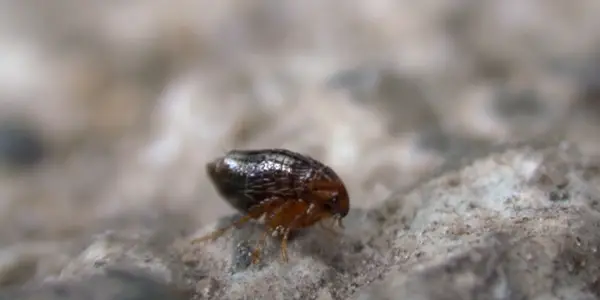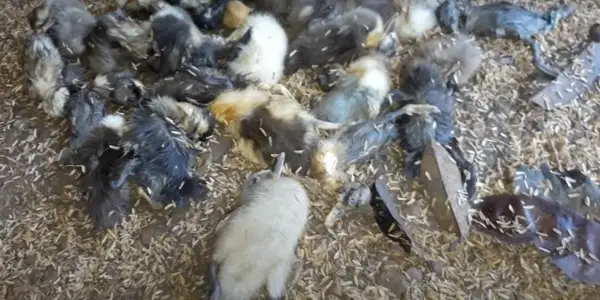Fleas are little, dark-colored insects that may leap far into the air. They consume blood and may go for lengthy periods of time without eating. Flea eggs and young can be found in bird nests and crevices in building walls or floors.
The sad part is that ducks are infected by one form of flea, which is mostly found around the eyes of newborns.
So, you want to know, can ducks get fleas?
Yes, ducks can get fleas. If you’re not careful, ducks may get fleas, mites, and other ailments on their bodies. While these contagious parasites may not be dangerous to humans, they can cause a great deal of suffering in your pet. Once ducklings are infected with fleas, they fall into a health risk.
To keep your ducks safe and healthy, you’ll need to learn everything you can about parasite problems, including where they come from and how to eliminate them. Let’s begin this article, on that note-
Are Ducks at Risk from Fleas?

Fleas are particularly hazardous to baby ducks because they feed on their hosts’ blood.
Female fleas may eat up to 15 times their own weight of food. As a result, ducklings afflicted with fleas may develop anemia or even die from blood loss if the infection is severe.
Also, adult ducks might be affected by these problems as well if the flea infection isn’t treated.
Is it True That Ducks Eat Fleas?
Smaller birds, such as starlings and robins, are known to consume fleas. But, ducks are unlikely to do so. It’s not so much a preference in terms of what they consume as it is that fleas are too little for them to efficiently hunt.
These parasites are extremely elusive, and a duck’s flat, the broad beak is just not up to the task.
How Are Fleas Attracted?

Fleas, like all other species, have unique demands and activities that aid in their survival. Fleas are attracted to a variety of things.
So what’s the deal with them being drawn to your ducks?
Warmth
Fleas thrive in warm environments, which is why they thrive in the summer and spring. Ducks retain heat in their feathers, making them flea-friendly hosts. As a result, they are attacked by fleas.
Carbon Dioxide
Fleas are attracted to carbon dioxide, a gas produced by warm-blooded species. Ducks crowing in confined settings will inevitably produce carbon dioxide. That is why they become infected.
Darkness
Flea larvae commonly hide in dark locations until they reach maturity.
How to Get Rid of Fleas?
Fleas may be a real pain to deal with. Since they can lay up to 50 eggs every day and live for up to two years. Even identifying these microscopic parasites is difficult. The best thing would be just to simply get out of the water as quickly as possible.
Then, take a shower. This is because fleas should be washed away immediately!
This is also why most beaches offer showers within walking distance. It is suggested that you wash before leaving for home if there are any fleas or parasites in the water.
Here are a few things you may do to get rid of fleas-
A Kind of Diatomaceous Earth
This is a powdered sedimentary rock produced from soft sediment. When a flea comes into touch with the diatomaceous earth, it destroys its exoskeletons. And, the microscopic particles adhere to their bodies, absorbing moisture.
After that, the fleas dry up and die. In as little as four hours, adult fleas can start to die.
Nematodes
Nematodes are tiny worms that eat and breed by parasitizing insects. They will also seek fleas, penetrate their bodies, and release lethal symbiotic bacteria. These bacteria will finally kill them after being applied to an affected region.
Cedar Mulch
Fleas and other common insects are repelled by cedar mulch. You may use them instead of straw to provide bedding for your ducks. Make sure it hasn’t lost any oil when you buy it. Fleas are not attracted to “de-oiled” mulch.
Grass Should Be Mowed And Clutter Should Be Removed
Fleas may hide and lay eggs in overgrown grass and debris such as logs and lumber heaps. To reduce flea hiding and breeding sites to a minimum, trim grass and eliminate the clutter of waste.
Is it True That Ducks Carry Maladies?

A healthier bird will have a low parasite burden because pathogens are removed through effective cleaning and gurning. The birds that are kept with poultry and have minimal water are the most vulnerable. When a bird is sick, it is more likely to become infected.
The head and neck region of all ducks is more difficult to clean than those of longer-necked birds. Parasites are more prone to live in close-packed feathers in the short neck.
If a bird is scratching excessively, especially if its eyes are not clear and brilliant, a parasite examination is indicated.
That said, ducks are lovely, tidy birds. However, all varieties of birds have a high risk of carrying a germ known as Salmonella.
You may contract the virus if you come into close touch with the droppings of an infected duck.
Salmonella bacteria can infect their beaks, feet, and feathers. Also, don’t be deceived by the appearance and color of the bird, which may appear clean from the exterior.
Because these bacteria are invisible to the naked eye, it’s impossible to detect if a bird is sick. This fact just adds to the disease-causing agent’s hazard. If you haven’t bathed your pet since you brought it home, the risk is even higher.
How Can I Keep My Ducks From Getting Infected With Bugs?
Because animals and birds cannot be maintained in a confined place for long periods of time, it is difficult to keep them free of pests and illnesses.
They like moving around freely, exposing themselves to dirt, diseases, and insects.
However, there are a few things you can do to dramatically reduce your risk-
Clean Up The Ducks
Make sure the ducks are bathed and scrubbed once a week with new, clean water. After that, you’ll have to ensure that there are no dirt buildups in the crevices or beneath the feathers.
Clean And Separate the Sleeping Quarters
Make sure there are no droppings gathering anywhere and that the sand or soil is clean and free of visible bugs. Also, keep other ducks and animals out as much as possible.
Vaccinate Your Ducks
Vaccinate your ducks against major infectious illnesses. Also, make sure your duck is surrounded by only inoculated and vaccinated animals.
Keep An Eye On Their Food
Make sure the food is fresh and clean before you serve them. Certain foods may contain contagious bacteria. Therefore inspecting the food package before eating is usually a smart idea.
FAQs
Is it necessary to treat duck fleas?
The parasite does not require special therapy to ‘cure’ or ‘get rid of it; as previously said, the parasite larvae die as they enter the skin. And the rash will ultimately go away on its own, however, it may take 10 to 20 days for some people to totally subside.
Is it true that ducks get mites?
Both domestic ducks and wild waterfowl are frequently infested with mites. Mites, which dwell within the bird’s feathers, are an ectoparasite. Younger, sicker, or damaged birds are more likely to have severe mite infestations.
What are duck lice, exactly?
It’s also known as duck rash, clam digger’s itch, or lake itch in the United States, duck lice in Canada, pou du canard in Switzerland, and rice paddy itch in rice-growing countries, in addition to its medical name of cercarial dermatitis.
Conclusion
Now if someone asks you- Can ducks get fleas, you’ll know the answer to it. In reality, these birds have the ability to spread mites and lice.
While these diseases are occasionally unavoidable, you may take the essential steps to avoid them. Don’t worry if your birds still get a bug, wash, clean, and get them inspected by a professional.
And, if your bird needs the vaccine, medicine, or anything else, the vet let you know. Always take care of your birdies. Goodbye!
- Can Ducks Eat Mushrooms? [Explained With Facts] - August 17, 2023
- Will Cayenne Pepper Keep Ducks Away? Answered in Detail - August 1, 2023
- Can Geese Eat Bananas? [Properly Answered] - June 27, 2023

